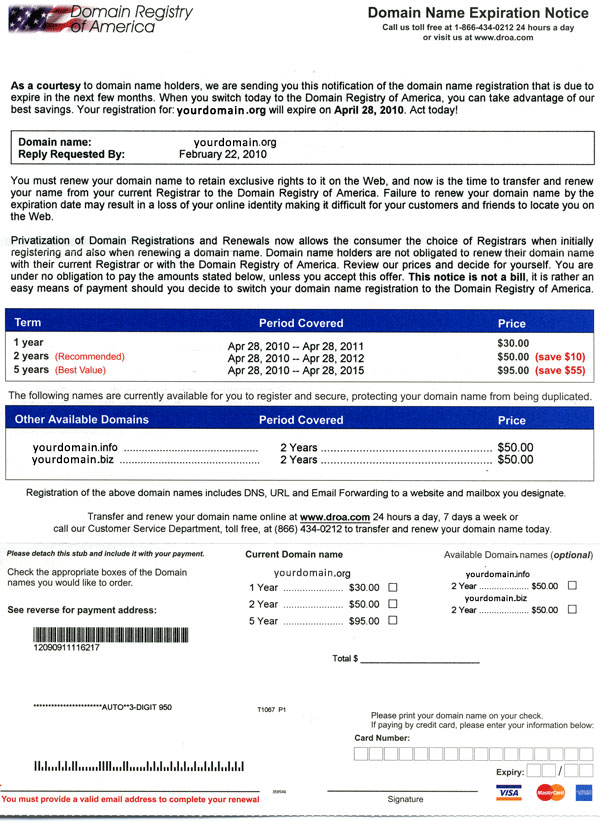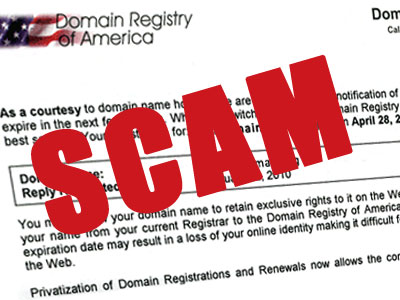Domain Registry of America and Domain Slamming
Domain Registry of America and Domain Slamming
If you have ever registered a domain name of your own, you may have received an alarming letter or ‘bill’ alerting you that your domain name is about to expire, and giving you an ‘easy way’ to renew it. The letters look legit at first glance. But checking with your host will usually indicate your domain is fine and does not need an urgent renewal. Even if it does, you can do so through your registrar for the normal price.
So what gives?
Is this a scam? How did they get that info, and is this even legal?
The answers are a little nebulous, like so many scams. We’ll shed some light on just what is going on here.
Domain Registry of America (among other names) is a borderline-legal scam designed to convince you to switch your web hosting for inflated prices. The company itself generally has a post office box in the United States, but seems to have other addresses in other countries and is presumed to come from abroad. This makes the legality more difficult.
Your postal address and information is obtained from “WHOIS,” a public database of registered domain names. The letter is not actually a bill, but carefully written document designed to persuade the domain owner to switch domain hosting to their company at highly inflated prices.
What to do?
If you receive one of these notices, the best thing to do is just ignore it. But let’s go into some detail on how you can be SURE you are not going to lose your domain name.
1) Know the name of your registrar. The registrar may or may not be the same as your web host, but know who your domain is registered through. If you get notices from anyone other than your registrar, you can generally dismiss and ignore them. As a note, your domain name and host may not expire at the same time.
2) Know when your domain name expires. This can save you the potential loss of a domain name and all the trouble that comes with that, and it can also spare you quite a bit of anxiety, wondering when the expiration date is going to happen. Some companies will email you to let you know, but it’s good to remember this anyway.
3) Put your domain name on autorenewal if at all possible. You can’t just do this and forget it – credit cards expire as well, and it’s good to check up on things, but if your domain is set to autorenewal it’s less likely to slip past you.
What happens if you lose your domain name?
Other than purchasing it back for generally much higher costs, there are not a lot of options after losing a domain name, beyond getting a new one, changing your business card and information everywhere, and making up for lost emails. The single best option is to educate yourself, not fall for the scams, to keep track of your own domain name renewal so as not to risk losing it to begin with.
Don’t let Domain Registry of America alarm you. This and many other scams are out to make a dollar (or many). Education is key. When you know what you’re reading, you know what you can ignore. And for more information on various scams, visit us here at Appletree MediaWorks.

Unions Need to Cover All Their Bases Online for a Grand Slam in Communications
Union Web Communication
First Base – a Website
Every local or organization needs a website to be the backbone and the known area for accessing information. Things move quickly through a social media page, but your membership will know it can always check the website for complete information on events and other local happenings.
Unions and organizations should be filling their website with the positive actions and photos of their membership. Big media prefers to post the negative about unions because it sells. So unions need to showcase their positive contributions. Your membership’s local action in giving back to the community should always be shared on your website. Every event, no matter how small should be shared on your website.
Always encourage participants to take pictures at events and ask them to email them to you or post them to your social media page so they can be transferred over to the website too. Website articles are more likely to be picked up by search engines than short social media posts. Writing articles doesn’t require a degree in journalism, just cover the who, what, where, why and when about the event and you’ll have a couple of paragraphs to go with your pictures. Putting a couple of minutes into Search Engine Optimization is worth it, too.
Posting articles to a website also shouldn’t require a college degree in web development. When we make a website for an organization we make it easy for their committees to post articles, even from their phones!
Second Base – Email Newsletters
Asking your membership to sign up for your email alerts should be a priority. Sending emails to your organization can be done for free using programs like Mail Chimp. Other low cost solutions include Vertical Response or Constant Contact. Emails are great for announcements and keeping your local up to date. Remember to keep emails short and your pictures small in size for your mobile readers. Instead of putting long articles in an email, offer an excerpt and a link to the article on your website.
A big win is that you can limit your email list to include only your membership, unlike most social media or a website where the public can view messages.
Third Base – Social Media
Right now, the top 5 Social Media Sites are Facebook, Twitter, LinkedIn, Pinterest, and Google+. The trick to unions using social media is to create an article on your website, then share it on your social media outlets and watch it spread virally. A good website setup includes automatic “share” buttons, so once an article is posted, its just a matter of clicking a button to share the post out to your social media channels.
Home Run – Communication Management
Managing all these communication outlets can be overwhelming. We recommend having a specific staff member or officer be your communications leader, and then set up a general email box for your membership to send their news to. From there, website posts can be scheduled in programs like WordPress. Emails can be scheduled in programs like Vertical Response and social media can be scheduled using Hootsuite or other social media management platforms. There you have it – a grand slam in online communications, and none of these tools are costly, most of them are free. If you’re looking for more information on any of these communication tools or you’d like a quote on a website for your union or organization, the Appletree Mediaworks is ready to explore your needs in depth and build a plan to achieve your goals.
An Extra RBI:
Keep your eye on the new, fast growing social media sites that focus on people meeting new people with similar interests including Tagged, Meet Me, and Meetup. We’ve got our eye on Meetup where groups of people with similar interests in a local area can make plans to participate in their hobby together. This could be big for unions to come together in a local area to make a huge impact.
For more information on union web communication, contact us – we can answer any questions you have!
Ebizmba.com, (2014). Top 15 Most Popular Social Networking Sites. [online] Available at: http://www.ebizmba.com/articles/social-networking-websites[Accessed 8 May. 2014].





